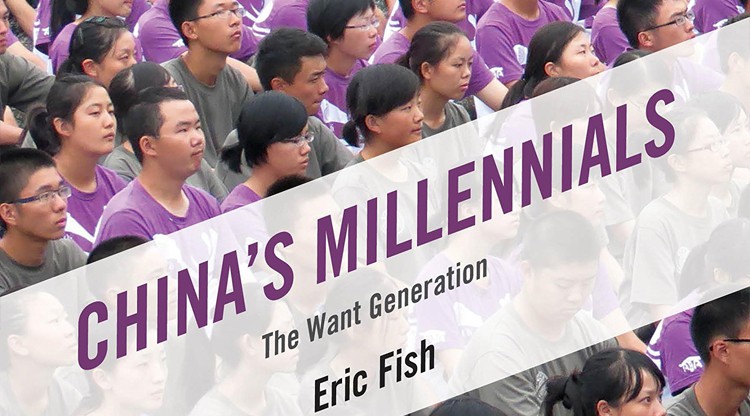When American journalist Eric Fish started teaching at a Nanjing university in 2007, the then 22-year-old found himself drawn to his students’ stories. Some were just a few years younger than he was, yet the experiences of these so-called ‘millennials’ – a generation to which I myself belong – seemed unique to China.
But as Fish became more familiar with just how good our lives are when compared to our parents’ and grandparents’, he also uncovered the distinct difficulties we face. Armed with “fascinating stories that needed to be told,” his forthcoming book China’s Millennials provides a new perspective on a generation that has come to reflect the social changes unfolding in modern China.
Across four chapters, the author analyzes the opportunities and challenges my generation encounter through the real-life tales of those he came to know. He frames their stories around the defining features of growing up in China: from the nationwide college entrance examination, the gaokao, to mandatory military training in school, junxun; from how we choose our future careers to the gender inequalities we face at marrying age.
But as well as considering societal pressures, China’s Millennials is very much a book about this country’s politics. One cannot be understood without the other. And believing it to be impossible to coherently write about the wider topic of ‘Chinese youth,’ Fish uses the interaction between China’s millennials and politics as a more precise frame of reference.
“I purposely focused on how politics is affecting youth and how youth are affecting politics, because it is a symbiotic relationship,” he tells me. “The subject of Chinese youth is far too big to comprehensively cover in one book. Even trying to comprehensively cover just the political aspects is perhaps a bit pretentious, but that was what I wanted to narrow my sights on.”
But is this focus misleading, given the pervasive stereotype of Chinese millennials as being largely apolitical? Indeed, Fish himself admits that when he asks young people about politics, it’s rarely high on their list of concerns, if at all. How much of a role does politics really play in our lives?
“Politics is a funny thing in China. The government has done a good job over the past two decades backing away from visibility in day-to-day life, but politics is never really too far away… especially in arenas concerning youth,” Fish explains, using the gaokao – which many people consider totally apolitical – to illustrate his point.
Most high school students obsess over the exams as a necessity for higher education and a successful career. Fish argues that few have any concept of how high-stakes testing has provided a form of social control for Chinese rulers for over a millennium: “It’s hard to escape politics. A lot of big issues that may not seem political actually have very big political implications.”
As well as the gaokao, China’s Millennials also discusses the impact of other major state strategies on young people, such as the One-Child Policy – which has aggravated the gender imbalance and put pressure on children to care for their parents – and the hukou system which keeps rural youth from keeping pace with their urban counterparts. Fish also addresses cultural challenges, like the entrenched gender stereotypes that prevent women from mirroring men’s economic progress. These problems, he argues, may often stem from China’s success, as people’s expectations outpace the realities of the country’s development.
Fish’s book gives me a chance to reflect on my own childhood and views on topics like education, careers, marriage and the pursuit of freedom. As a Chinese millennial, I experienced most, if not all, of what he presents in his work. I agree that, while many young people in China would not list politics at the top of their priorities, it influences every aspect of our lives. Corruption too, has a drip-down effect and may lie behind many of the things that we complain about.
My peers and I ignore injustices in our lives but treat unfairness as an inevitable part of the human condition. We know that our routes to success may be blocked by corruption, compromise or the need to betray our original intentions, yet every year millions of us still fearlessly join the “army that marches across the single wood bridge” (as the civil service examination is often described). Most of the time, we notice problems but choose not to challenge them. Instead, we carefully calculate the potential gains and losses before attempting change, or simply try to figure out how to benefit from corruption. Challenges to the status quo are viewed as the actions of the depressed losers who fail to benefit from it.
It is this trait of our generation that I find depressing. But when viewed in a wider context, we may find that the challenges facing the Chinese millennials are shared by our contemporaries worldwide. In 2006, Jean Twenge’s book on American millennials, Generation Me, concluded that our young counterparts in the US are more tolerant, confident, open-minded and ambitious than those before them. But they are also more cynical, depressed, lonely and anxious. Fish sees this parallel as a valuable consideration.
“You can recognize a lot of the same tendencies in Chinese millennials today,” he argues. “Like Americans, they were brought up during a period of economic boom with somewhat lofty expectations, but then started to become disillusioned when [they found that] the realities of adulthood in a post-recession world weren’t quite what they had expected. Both young populations are facing similar problems of higher unemployment, devalued college degrees, wealth inequality, lack of direction, lack of meaning and a higher entrance fee for the status and the dreams that their parents had.”
This paints an unpromising picture of my generation. So, as someone who grew up outside China and has instead observed it from up close, does Fish see hope for China’s millennials? In fact, he proves more positive about us than many Chinese: “[They] are definitely starting to speak up more and are becoming less afraid of pushing change.”
“The stereotype, for a long time, has been that this generation only cares about money. But that’s not broadly true anymore. A lot of youths, especially among the growing middle class, are starting to care very much about less material things like the environment, various social causes, spiritual endeavors and even politics.
“There [also] seems to be growing empathy for those who’ve been left behind amid China’s growth. These all seem to be positive trends,” Fish says. But he can only wonder how they’ll develop in the coming years – as do I. “In recent Chinese history, positive trends have had a way of being abruptly halted from above. Hopefully that’s not how it will pan out this time.”





















0 User Comments